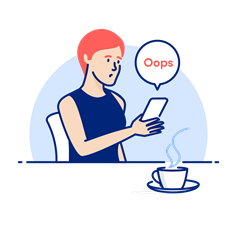First time buyers: things you need to know before applying for a mortgage
Taking out a mortgage for the first time can be a daunting prospect. Finding the home you want and saving for the deposit are big steps to take, so it’s important to prepare and make sure you get the right mortgage.
So, what do I need to do before applying?
1. Make sure your credit report is in good shape
When you apply for a mortgage, lenders will have a detailed look at your credit file to assess whether they think you have your finances in good enough order to manage taking on mortgage repayments.
Making sure the information is correct and up-to-date will mean you’re putting your best financial foot forward and up your chances of being accepted for the best mortgage deals out there.
When looking to get a mortgage - the biggest debt of your life, most likely - they won’t want to see a lot of other debts or credit cards on your credit report. So, before you get to the point of applying for a mortgage, do whatever you can to pay off existing debts.
If you're not sure what lenders are looking for when it comes to credit scores or how to improve yours, then this blog is a must-read.
2. Don't miss a step!
Often you need to secure a Mortgage in Principle (MIP) - also known as an Agreement in Principle (AIP) - before estate agents will show you properties. This is to give them the peace of mind that you are able to borrow the amount you will need to actually make a purchase. To apply for a mortgage in principle you will need:
a. 6 months of payslips (or 3 years of accounts if you’re self employed)
b. Three months’ of utility bills as proof of your current address
c. A valid form of photo ID such as a passport or driving license
You typically receive your MIP results within 24 hours and they are typically valid for 90 days. It’s also worth remembering that a MIP is not a guarantee that you’ll get a full mortgage approved - you still need to go through this process.
3. It’s not a time for change
Being stable and having a steady income is important when you’re applying for a mortgage. Most lenders will want to see what you have been with your employer for a decent period of time. So if you’re considering a job switch it’s better to wait until your mortgage is in place. If you’ve recently switched jobs, it’s best to wait until you’ve passed any probationary periods and have 6 months of tenure under your belt before applying.
4. Get organised
When applying for a mortgage you need to know a certain number of things and be quite advanced with your property search. If you’ve already got a Mortgage in Principle, it can help speed up this process as some of the admin is done. But for the full application you will need to know:
- What property you want to buy,
- How much you have available as a deposit,
- How much money you want to borrow, and for how long,
- What type of interest rate you want to borrow,
- What monthly repayments you can afford & your plan for keeping up with repayments.
5. Don’t overstretch
Typically you can borrow up to five times your salary for a mortgage. Brokers will always tell you the maximum that you can borrow - but just because you can do something, doesn’t mean you should. When looking at a mortgage and buying a house, you need to factor in a variety of other costs to ensure you can afford all of this in addition to your mortgage repayments:
- What your future home’s bills will look like - property websites typically help provide an estimate
- Ongoing maintenance costs to make sure you’re not going to be overstretched should something need repairing once you’re in
- Moving costs - how much stuff do you have and how far are you moving? Look at a quote if you’ll need help with the move
- Legal fees for the property purchase - these can be up to £2,500 depending on the process
- Arrangement fees - some mortgages require a fee to be paid (it can also be added to your mortgage)
- Stamp duty - a tiered payment payable on properties over a threshold of £300,000 for first time buyers
- Broker fees which can be up to £1,000
- Surveys and valuations which can cost from £200-£1000 depending on the type of property and surveys you choose
6. Do your research
There’s a lot out there. Comparison sites are great for giving you a quick view of what’s on the market and which banks and lenders are most competitive and you might want to explore. You can compare mortgage deals on money.co.uk, Comparethemarket and MoneySuperMarket.
It may also be worthwhile to use a mortgage broker. They can give you an idea of how much you will be able to borrow and how much your monthly repayments will be. Mortgage brokers can be expensive but some are free so it’s worth looking into and seeing if it’s for you. If you have a lot of questions that are unanswered, you may find that a mortgage broker could be invaluable to help your first time buyer journey. Habito is a free mortgage broker who can help you find the right deal for you.
7. Learn the lingo
If you want to narrow down your search, here are a few terms you might be seeing for the first time and what they mean;
- Tracker Mortgages: this is a type of variable rate mortgage. This mortgage follows the movement of another rate: most commonly it tracks the Bank of England Base Rate. As the rate is variable, you can benefit from lower payments when the rate is low, but will suffer from higher payments if the rate being tracked goes up.
- Fixed-rate Mortgage: this is a mortgage where the interest rate will stay the same for a set period: typically, 2 or 5. After this period you can choose to remortgage or the rate will then revert back to tracking interest rate fluctuations.
- LTV: a financial term used by lenders to express the ratio of Loan-to-Value of an asset purchased. Put more simply it's the amount that you own outright (deposit), compared to the amount that is needed to be borrowed and then paid back in order to fully own the home.
8. Know the process
It can be a stressful time so the key to keeping a level head throughout is understanding the full mortgage application process. It is usually split into two stages:
- Step One: the lender will go through all the information you've provided in your application to assess whether or not you're ready for the commitments that come with a mortgage.
- Step Two: assuming this Step One goes to plan, the lender will kick off a series of background checks to verify your employment and review the information available on your credit report.
9. Is it a yes?
Passing step one and two usually means you'll be approved for a mortgage, and then the lender will provide you with a ‘binding offer’ with which you have a 7 day 'reflection period'.
This can be waived if there is time pressure on your purchase. If all is okay then you can go ahead and sign your loan agreement, and there you have it - you have your mortgage.
10. Exchange, complete & move!
Once your mortgage is approved, the last steps are to sign and exchange contracts with the seller - this means you’re legally committed to the property. You will then need to pay your deposit and can then complete your property purchase. At this point your mortgage will kick in and you will be a homeowner!
For more information on the things to consider when buying a home, click here.
Sign up to our newsletter
Our newsletters bring you the latest articles to help you improve your financial wellbeing.
If you want to consent to receiving our newsletter please enter your email below to subscribe. If at any point you want to withdraw your consent please email hello@salaryfinance.com. For more information about how we use your personal data see our privacy notice.



